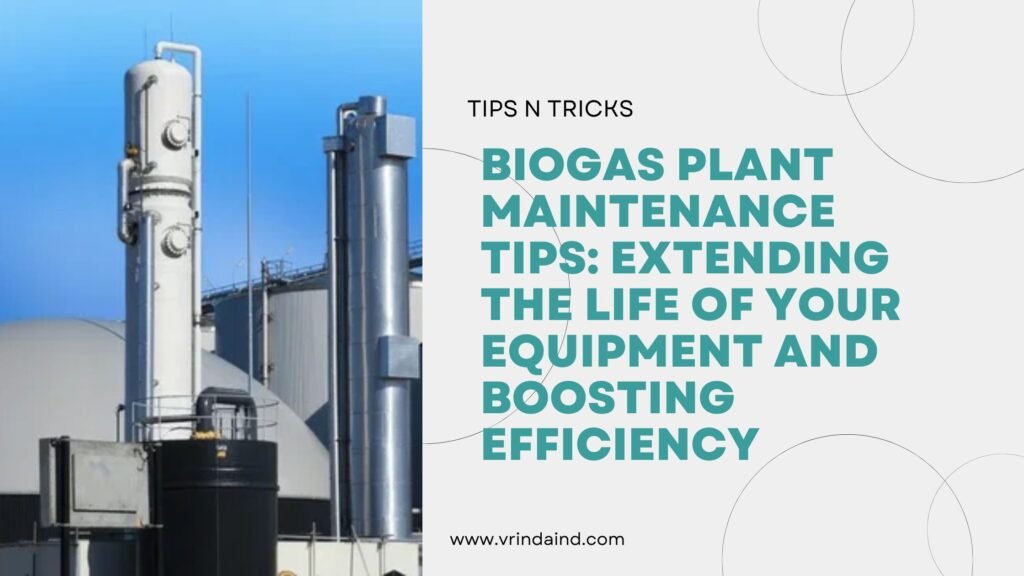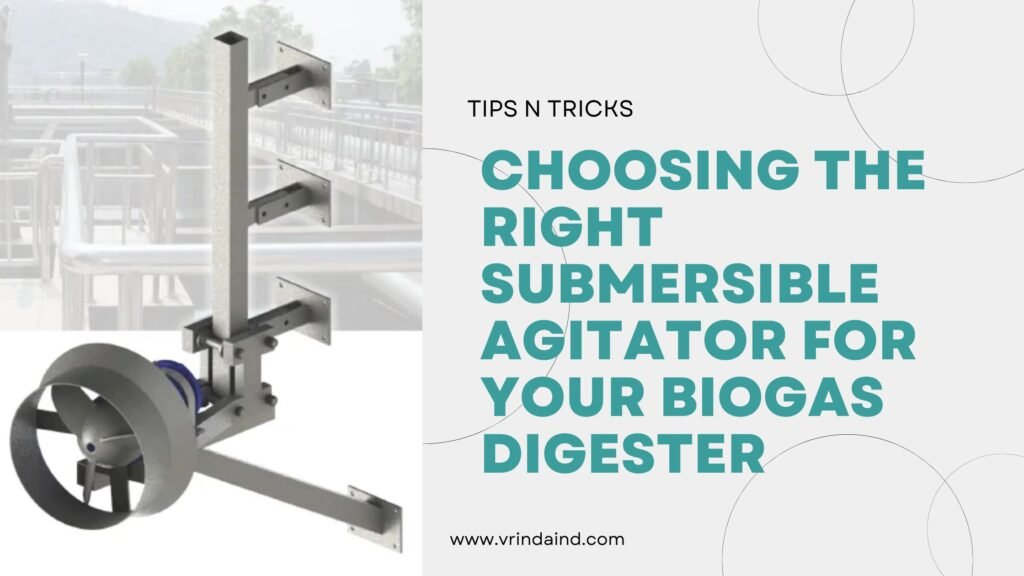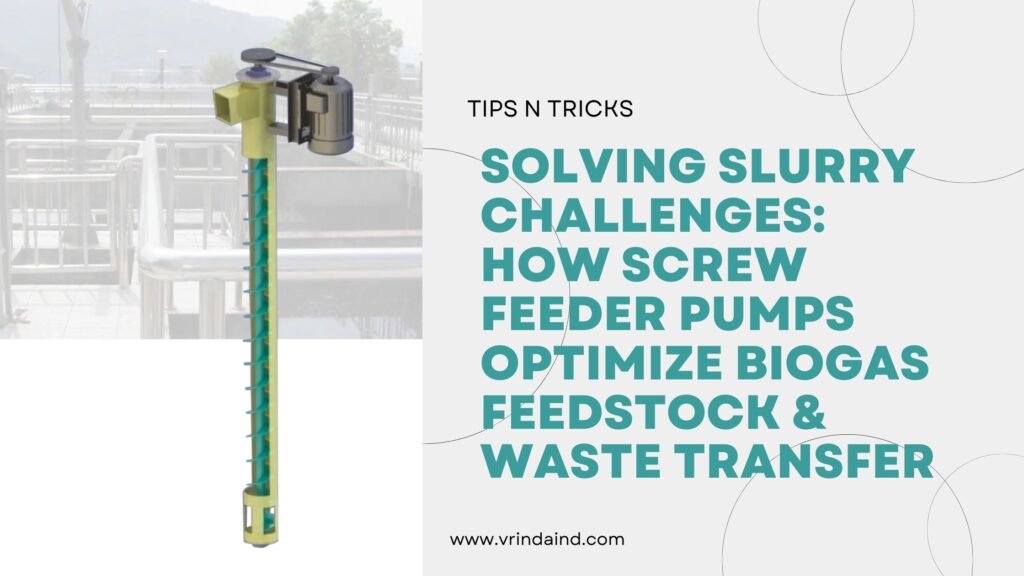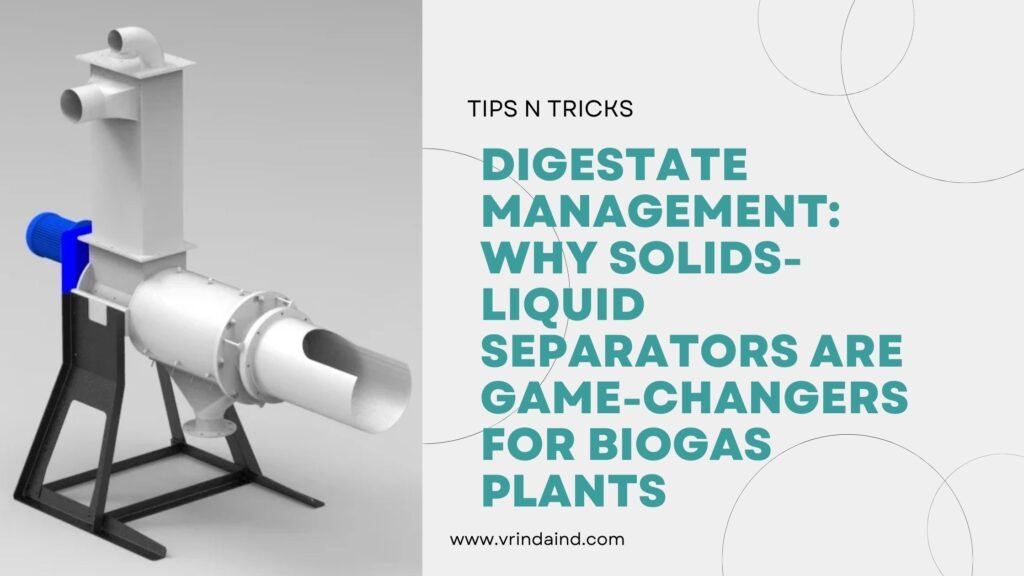A biogas plant is a dynamic ecosystem, continuously converting organic waste into valuable energy and resources. While robustly designed, like any complex industrial facility, consistent and proactive maintenance is paramount. Neglecting regular checks can lead to costly breakdowns, reduced biogas yield, and significantly shortened equipment lifespans.
At Vrinda Industries, as a leading biogas plant equipment manufacturer, we know that the long-term success of your plant hinges on proper care. This guide provides essential biogas plant maintenance tips to help you keep your operations running smoothly, efficiently, and profitably for years to come.
Why Regular Maintenance is Crucial for Your Biogas Plant
Think of maintenance as preventative care for your investment. For a biogas plant, its importance cannot be overstated:
Ensures Continuous Operation: Minimizes unscheduled downtime and costly production halts.
Optimizes Biogas Yield: Well-maintained equipment and stable digester conditions lead to maximum gas production.
Extends Equipment Lifespan: Protects your valuable assets from premature wear and tear, reducing replacement costs.
Enhances Safety: Addresses potential issues before they become hazards, ensuring a safe working environment.
Improves Efficiency: Ensures all components are working optimally, reducing energy consumption and operational costs.
Environmental Compliance: Helps maintain system integrity, preventing leaks and ensuring responsible waste management.
Key Maintenance Areas & Essential Tips for Your Biogas Plant
Here’s a breakdown of critical areas requiring regular attention in your biogas plant:
1. Digester & Mixing Systems (Agitators/Mixers)
Visual Inspections (Daily/Weekly): Check for unusual foaming, scum layer thickness, or signs of stratification.
Agitator Performance (Daily): Listen for unusual noises, vibrations, or changes in mixing patterns. For submersible agitators (like those from Vrinda Industries), ensure proper submersion and clear propeller area.
Nozzle & Inlet/Outlet Checks (Weekly): Ensure feeding and discharge points are clear of blockages.
Motor & Electrical (Monthly/Quarterly): Check wiring, connections, insulation, and motor cooling for submersible units.
2. Pumping Systems (Screw Feeder Pumps, Roto Screw Pumps)
Leak Detection (Daily): Inspect seals, flanges, and connections for any signs of leakage.
Wear Parts (Monthly/Quarterly): Monitor the condition of rotors and stators for wear, especially when pumping abrasive slurries. Replace as per manufacturer’s recommendations.
Lubrication (Regularly): Ensure bearings and seals are properly lubricated.
Blockage Prevention (As Needed): Regularly check inlet/outlet lines for obstructions, especially with high-solids feedstock.
Flow & Pressure Monitoring (Daily): Ensure pumps are operating within design parameters.
3. Gas Management System (Gas Lines, Storage, CHP Unit)
Leak Detection (Daily/Weekly): Use gas detectors or soap solution to check all connections, valves, and biogas storage units for leaks. Methane leaks are both unsafe and wasteful.
Pressure Monitoring (Daily): Ensure gas pressure is stable and within safe limits.
H2S Removal (Regularly): If your plant has an H2S scrubber, ensure its media is effective and replaced as scheduled to protect downstream equipment (like the CHP unit).
Condensate Drains (Daily): Drain condensate traps in gas lines to prevent blockages and corrosion.
CHP Unit (As per Manufacturer): Follow the CHP manufacturer’s specific maintenance schedule for engine oil, filters, spark plugs, and cooling systems.
4. Digestate Management Systems (Solids-Liquid Separators)
Screen Cleaning (Daily/Weekly): Regularly clean the screens of your solids-liquid separators to maintain separation efficiency and prevent blockages.
Wear Parts (Monthly/Quarterly): Inspect the screw/auger and pressing components for wear, particularly if handling abrasive digestate.
Discharge Consistency (Daily): Monitor the dryness of the solid output and clarity of the liquid output to ensure optimal separation.
5. Heating System (If applicable)
Temperature Monitoring (Daily): Ensure the digester temperature remains stable and within the optimal range for your bacteria.
Heat Exchanger Inspection (Quarterly/Annually): Check for scaling or fouling that could reduce heat transfer efficiency.
Boiler/Heating Unit Maintenance (As per Manufacturer): Follow the specific maintenance guidelines for your heating source.
6. Instrumentation & Controls
Sensor Cleaning & Calibration (Regularly): Clean and calibrate temperature probes, pressure sensors, and gas analyzers to ensure accurate readings crucial for process control.
PLC/SCADA System Checks (Monthly): Verify proper operation of control logic and alarms.
Establishing a Maintenance Schedule
For effective maintenance, implement a tiered schedule:
Daily Checks: Visual inspections, basic parameter monitoring, leak detection.
Weekly Checks: More detailed visual inspections, cleaning screens, minor lubrication.
Monthly/Quarterly Checks: Wear part inspections, advanced lubrication, filter checks.
Annual Checks: Comprehensive overhauls, major component inspections, professional servicing.
The Vrinda Industries Advantage: Quality Equipment & Support
Investing in high-quality biogas plant equipment from a reliable manufacturer like Vrinda Industries is the first step towards a low-maintenance, high-performing plant. Our equipment, from submersible agitators to screw feeder pumps and solids-liquid separators, is designed for durability and ease of maintenance in demanding environments. We also provide the necessary technical support and spare parts to ensure your long-term operational success.
Proactive Maintenance: The Key to Biogas Plant Longevity
Regular, systematic maintenance is not an expense; it’s an investment that pays dividends in consistent biogas production, extended equipment life, reduced operational costs, and a safer working environment. By prioritizing the health of your biogas plant, you ensure its continued contribution to a sustainable future.

Contact Vrinda Industries today to discuss your maintenance needs!




